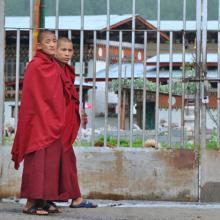bhutan
The South Asian nation of Bhutan has been rocked by a sexual abuse scandal in which young Buddhist monks molested by older monks fled their monastery and reported the abuse to journalists.
While rumors about child sexual abuse in monasteries have swirled around this tiny Buddhist nation for a while, this is the first time confirmed cases of underage monks molested by their seniors have come to the fore.
“Every time I tried to scream or struggled, he pinned me with his body, put his hand over my mouth and covered it tightly,” an 11-year-old boy told the magazine The Raven describing how he was sexually abused by a 20-year-old monk in a monastery in Punakha, about 45 miles northeast of the capital city of Thimphu.
NEW DELHI — Political leaders in the tiny Buddhist nation of Bhutan have announced a nearly six-month ban on all public religious activities ahead of the upcoming elections, citing the Himalayan nation's constitution that says “religion shall remain above politics.”
A notification by the Election Commission of Bhutan asks people's "prayers and blessings" for the second parliamentary election, expected in June 2013. But it also states that religious institutions and clergy "shall not hold, conduct, organize or host" any public activity from Jan. 1 until the election.
The ban comes a year after the country's religious affairs ministry identified Buddhist and Hindu clergy who should be barred from voting to keep a clear distinction between religion and politics.
THIMPHU, Bhutan — In a country that prides itself on measuring quality of life in terms of "Gross National Happiness," this small Buddhist kingdom in the Himalayas seems to have a problem: at least half its citizens aren't happy, according to its own measurements.
While more than 90 percent of the 7,142 respondents said they were "happy" in a recent government survey, only 49 percent of people fit the official definition of total happiness by meeting at least six of the survey's nine criteria.
Bhutan's fourth king, Jigme Singye Wangchuck, coined the phrase GNH in 1972 on the belief that people's happiness did not depend on the nation's economic wealth alone.
GNH indicators -- as opposed to more traditional measures like a nation's gross domestic product based on economic activity -- recognize nine components of happiness: psychological well-being, ecology, health, education, culture, living standards, time use, community vitality and good governance.


